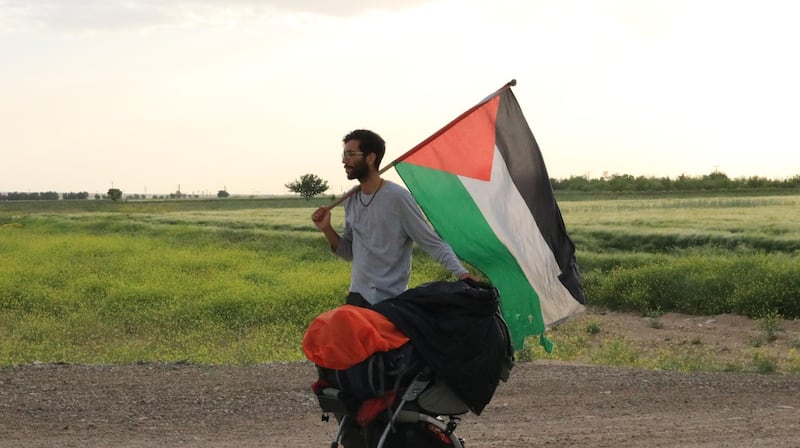When Benjamin Ladraa set out to walk from Sweden to Palestine, his aim was to raise awareness about the human rights violations committed by Israeli forces and the brutal realities of life under occupation for the Palestinian people.
After 10 months on the road, having crossed 13 countries on foot, his own awareness has also shifted in ways he had not imagined.
Ladraa, a 25-year-old Swedish activist, set out from the Swedish city of Gothenburg on August 8, last year, intending to walk to Jerusalem, a journey of almost 5,000 kilometres across 14 countries. When he arrived in Lebanon this month, he had been walking for almost a year, often for eight or 10 hours a day. Without conscious planning, his walk has taken him along the same routes used by refugees and migrants seeking safety and stability in Europe – only Ladraa is travelling it in reverse.
“I’m sort of feeling how it is to walk in other people’s shoes, because a lot of people assume that I’m a migrant, I’m a refugee, especially in Europe,” says Ladraa, who has glossy black hair and a deep tan from walking thousands of kilometres in the sun, and who walks with a Palestinian flag on his back. “People call the police on me all the time ... I’ve met everything from the military police and secret services to normal police, civilian police, anti-terror police, Swat teams.
“I met some refugees on the road. It’s very tough,” he says. “For them, if the police come only once, it’s over. They get arrested and they get deported to the country where they did their Dublin fingerprint – usually Greece or Italy. My passport grants me so much access. Every day you realise what a privilege it is to be someone from Sweden. It’s so easy to travel. You don’t really ponder this too much until you realise how hard it is for everyone else in this extremely unfair system.”
It hasn’t all been easy, however. Ladraa recalls nights spent sleeping in abandoned buildings, going to bed hungry and thirsty, lugging the pushchair in which he carried his heavy packs and his tent through a metre of snow in the Bulgarian winter.
Just crossed the border to Bulgaria! #walktopalestine pic.twitter.com/Fv9r3w81Hb
— Solidarity Rising (@SolidarityRisin) February 26, 2018
“People have a difficult time seeing why I’m doing this,” he says. “It’s to free Palestine. I thought a lot about what effective activism would be. What can you do as an individual?”
Ladraa first became aware of the struggles faced by Palestinians when he formed a friendship with a Palestinian family living in Sweden. In April last year, he spent three weeks travelling around Palestine. He heard stories of Palestinian houses being seized by Israeli settlers, of systematic discrimination, arbitrary detention and violence.
My tent yesterday morning. Each night is a search for some flat good ground to sleep on pic.twitter.com/Ed9TJwGlWj
— Solidarity Rising (@SolidarityRisin) October 12, 2017
He returned to Sweden determined to do something to oppose what he perceives as a state of apartheid.
“I believe in order for progress to be made we need to put pressure on Israel to stop their crimes against the Palestinian people,” he says. “The way to put pressure is have many people wanting it and taking action, and the way to make people take action is by informing them about the situation, because most people don’t know.”
As he walks, Ladraa has set himself the task of talking about life under occupation to as many people as possible, giving talks and interviews wherever he can. He has met up with displaced Palestinians living in every country along the way, inviting them to tell their stories, which he shares with the 11,500 followers on his Instagram page (@walktopalestine).
___________________________
Read more:
Gaza: the choice of life in an open-air prison or being shot is no choice
Nakba Day is a reminder of the need for a peaceful solution for Palestinians
What Walaa Wants: the Palestinian girl whose dream inspired a prize-winning film
___________________________
Ladraa spent a week crossing Lebanon, after arriving in the northern Lebanese city of Tripoli by boat from Turkey, visiting six Palestinian refugee camps along the way. Unable to cross the closed Lebanese border with Israel, he backtracked to Beirut and flew to Amman, from where he plans to walk to the Israeli border and attempt to cross into Palestine. After being searched by a bomb squad while passing the Israeli embassy in Prague, Ladraa is certain that the Israelis are expecting him.
"I would be disappointed if they didn't expect me, because that would mean I didn't do a good enough job," he says. "The best evidence that you did something good for oppressed people is to get a reaction from the oppressors. I don't expect that they will let me into Palestine. They don't like people to talk about their crimes, so they block the people who do that."
Ladraa has gathered thousands of supporters over the duration of his walk, but he has also found his message hijacked by politicians or distorted by media outlets, and faced anger from those who disagree with his views on Israel or accuse him of interfering in a cause that is not his own.
“Meeting enough people, you realise that we are all pretty much alike,” he says. “We all like to sit at a nice coffee shop and talk about our problems in everyday life, like work and studies and kids and the future. I don’t really see that it’s a different cause. “Every cause is the same – the cause for equality, justice, freedom, decent lives for everyone.”





